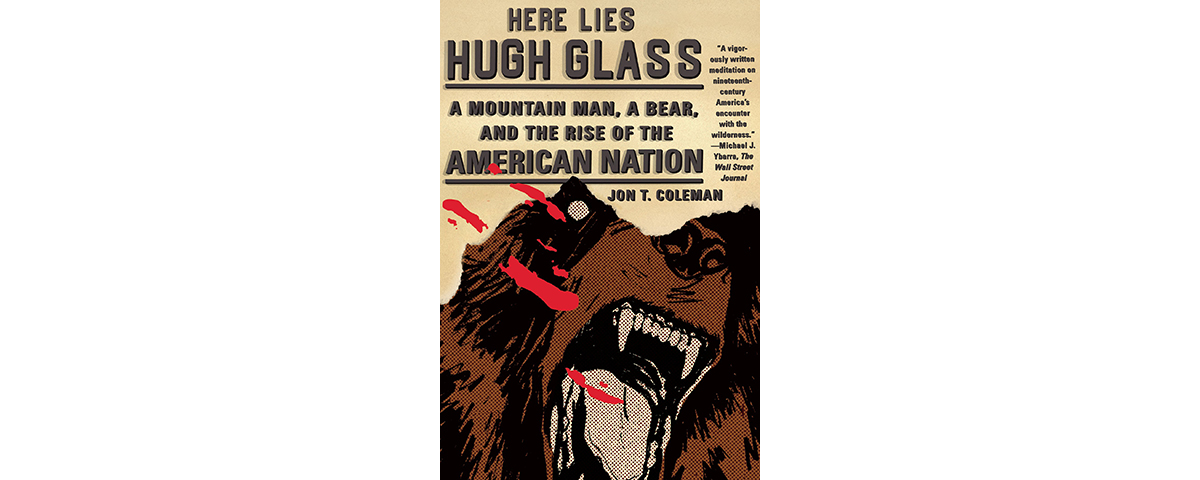Here Lies Hugh Glass: A Mountain Man, a Bear and the Rise of the American Nation, by Jon T. Coleman, Hill and Wang, New York, 2012, $28
Those readers familiar with frontier lore have likely heard of Hugh Glass. You’re certainly familiar with the myth behind his story if you’ve caught The Revenant on the big-screen. If not, author and American history professor Jon Coleman introduces the luckless mountain man in the brutal opening paragraph to Here Lies Hugh Glass:
Hugh Glass nearly ended his days as meat. In August 1823 a female grizzly bear attacked him. She caught him as he scrambled up a tree, slicing a gash with a fore-claw from scalp to hamstring. She bit his head, punctured his throat and ripped a hunk from his rear. The bear tore him “nearly to peases” and actually swallowed a few mouthfuls before Glass’ associates shot and killed her. Expecting his hunter to die soon, Colonel Andrew Henry bribed two men to wait and bury the body. The expedition traveled on, and after six days the death watchers left, too, abandoning their comrade, who was still sucking breaths through a punctured trachea. Unable to walk, subsisting on insects, snakes and carrion, an enraged Glass crawled and hiked 200 miles to Fort Kiowa to kill those who had left him to die.
Glass stands apart in the pantheon of American frontiersmen. The facts are astonishing, his ordeal unimaginable. His is the ultimate survival story, the epitome of endurance—and it is not the subject of this book. “There’s not much left of this man,” the author readily admits. “He contributed one letter to history. He spoke to people, but the writers who tracked him through twice-removed conversations only disfigured him further with their literary ambitions, calling him America’s Odysseus, a laughable honorific for a working-class guy whose major talent, accident proneness, made him more Homer Simpson than Homeric.” With that, Coleman steps out on a limb thinner than the one from which Glass hung like a piñata. It’s a happy place for this deft writer, who uses the oft-told tale of Hugh’s horrific mauling to frame a discussion on the role of frontier mythology in the rise of American exceptionalism.
The legend of the mountain man and the bear spread like a prairie fire, first surfacing within a couple years of his attack in an 1825 Philadelphia literary journal under the title “The Missouri Trapper,” by frontier writer James Hall. Through Hall’s prism, Glass became a romantic figure, a member of that “hardy race” of backwoodsmen, who “manfully endured” his struggle with “the grim king of terrors.” Others followed to reimagine Glass, among them poet John G. Neihardt, with his 1915 heroic epic The Song of Hugh Glass; author Frederick Manfred, with his 1954 historical novel Lord Grizzly; and director Richard Sarafian, with his gritty 1971 film adaptation Man in the Wilderness, starring Richard Harris as Zach Bass. The most recent depiction—2016’s The Revenant, with Leonardo DiCaprio as Glass—takes the story a few steps further into the mythical realm.
“How do you explain the astonishing sticking power of a historical wisp who grabbed headlines for withstanding occupational hazards?” Coleman asks in his irreverent tone. The short answer is the shaping power of myth. “Watching, hearing and reading may sound like passive forms of aggression next to scalping and cannibalism,” the author muses, “but consumers thrust themselves into the conquest of the region through the Westerns they bought. Americans exaggerated the exceptionalism of the West in order to appropriate and incorporate it into their nation.…The West kept the nation spry. Hemmed in by ancient boundaries, European nations grew decadent, old and sickly. Forever young, always on the move, the United States of America radiated health, vitality.” And “restless edge dwellers” like Glass, suggests Coleman, enabled storytellers “to dramatize the painful rebirth of America out West without exposing the citizens of the United States to actual discomfort.”
Certainly, Americans continue to live vicariously through their heroes, albeit a largely softer variety. Coleman, too, joins the “parasitical chain” and feeds on Glass—and why not? It is a gripping story, one that fascinates and repulses like all great survival epics. Given his ambitious treatise, though, Coleman is prone to wander in the wilderness. At the end of one especially ambulatory chapter that strays from the 1820s Missouri River expeditions to Shakespearean drama, Herman Melville’s satire and the stirrings of Western fiction, Coleman himself admits, “I’ve come a long way from Hugh Glass.” He manages to crawl back on course, taking some interesting detours along the way.
So, whatever happened to Hugh Glass? For starters, he didn’t “kill those who had left him to die,” just chewed them out, if you’ll pardon the expression. He narrowly escaped hostile Arikaras in 1824 but fell victim to other Arikaras in 1833. He was 53—an old man by frontier standards.
—Dave Lauterborn





